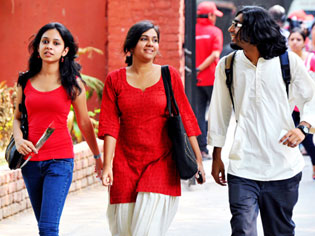
Mumbai, Mar 6: Punjab, Delhi, Himachal Pradesh and Haryana have been ranked at the top of the Well Being Index (WBI), while southern states, Gujarat and most of the north-eastern states emerged as the most secure ones for women in the Female Security Index (FSI).
This was found by Tata Strategic Management Group which analysed multiple government sources and surveys to publish its 2013 edition of Well Being Index (WBI) and Female Security Index (FSI) for India here today.
The states of Punjab, Delhi, HP, Haryana and Kerala, Tamil Nadu, Andhra Pradesh were ranked at the top of the WBI, while Chhattisgarh, Assam, Jharkhand and Bihar appeared at the bottom, Tata Strategic Management Group Chief Executive Raju Bhinge said.
On the FSI, Hyderabad and Delhi were the lowest-ranked amongst the metro cities, while Chennai and Bangalore were at the top. Southern states, Gujarat and most of the north-eastern states emerged as the most secure for women, while Haryana, MP, Punjab, Delhi and Rajasthan states had the lowest ranking on FSI, Bhinge said.
"The findings of WBI and FSI will be useful for entities working on improving overall well-being of rural and urban India and those working on women's safety and empowerment," Bhinge said.
The key findings of the WBI 2013, includes most of the peninsular India and north India was rated average or better on WBI, while most of Central and East India were average or worse-off compared to rest of India. Metro cities like Mumbai, Chennai, Kolkata and Haridwar were the best ranked districts in WBI in their respective regions, while less known districts like Mahe and Thiruvallur were among the best 20 districts in India on WBI.
Tata Strategic said it has measured the material well-being of a consumer household along eight key dimensions: home, kitchen, hygiene, entertainment, communication, transportation, education and healthcare.
Using the household data, the district-level well-being was measured and finally all districts were ranked on the basis of the WBI. "Assessment of people's well-being is incomplete without the well-being of women in Indian society," Bhinge said, adding that it used the FSI to measure the safety of women in the society.
Social parameters consisting of gender ratio in the 0-6 year age group, dowry deaths and rape crimes against women were used to create the FSI rank of all the districts in the country.
"The study brings to us some interesting findings. Southern states, Gujarat and most north-eastern states rank high on FSI. The lowest ranked on FSI are Haryana, HP, Punjab and Delhi. The top 10 WBI list includes two clusters: Tamil Nadu, Andhra Pradesh, Kerala and Punjab, Delhi, Haryana.
Incidentally, Tamil Nadu is the only large state to figure amongst the top 10 in both the WBI and FSI rankings," Bhinge said. The findings of the FSI said that there is a clear divide between North and South India on women's security.
While southern states, Gujarat and most North-Eastern states emerged as the most secure for women, Punjab, Madhya Pradesh, Haryana, Delhi, Rajasthan and UP were the worst states on FSI. Delhi-NCR also had higher rape incidences and dowry deaths per lakh female population compared to other top 8 cities.
On gender ratio in the 0 to 6 years age group, there was a clear divide with North and West India seen to be worse compared to the rest of India. A comparison of WBI and FSI reveals no clear correlation between female security and well-being in a state. Southern states were the only ones faring well on both the parameters, while eastern states predominantly lag on both. Some of the economically-advanced states like Delhi, Punjab and Haryana were the lowest in female security, he said.








Comments
Add new comment